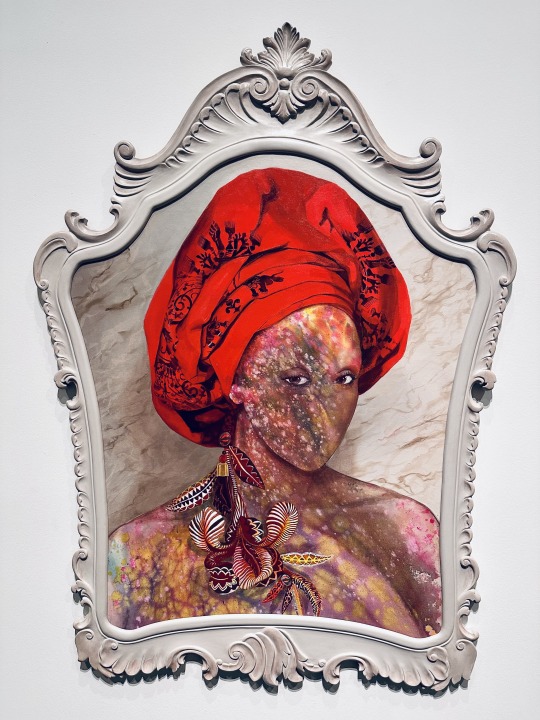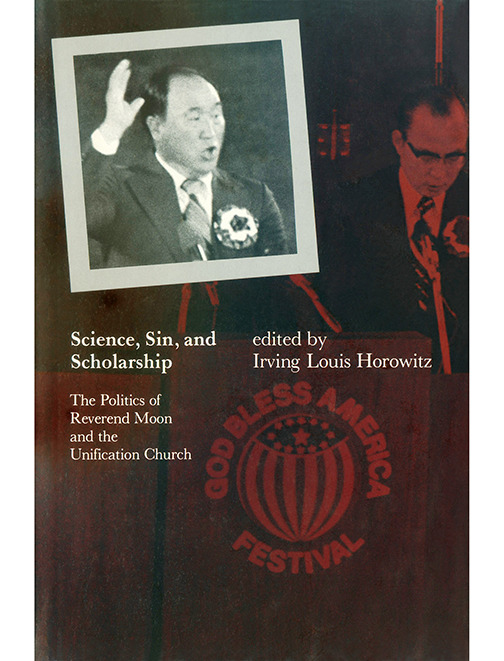#berkeley l hendricks
Explore tagged Tumblr posts
Text






Seen @ LACMA
#lacma#los angeles#afro atlantic histories#kerry james marshall#firelei baez#dalton paula#alison saar#berkeley l hendricks#race in america#race in the americas#transatlantic slave trade#portraits#art#contemporary art#jim crow#resistance#insurrection
4 notes
·
View notes
Text
Science, Sin, and Scholarship: The Politics of Reverend Moon and the Unification Church

edited by Irving Louis Horowitz
MIT Press, 1978 • 290 pages • ISBN: 978-0262580427
SOCIOLOGY/RELIGION
With the exception of some potboiler propaganda and an “official” biography, there has been no objective literature on the Unification Church, Reverend Moon, or the rise of new sects and cults in the United States. Science, Sin, and Scholarship is the first basic overview of this extremely powerful and influential religious sect.
Essays and documents in the book cover the theory and theology of Sun Myung Moon; the metaphysics of Moon; the politics of Moon—including the activities of the Korean CIA in the United States, the Korea lobby, Moon’s pro-Seoul activities, and the civil liberties of sect members; and the psychology and sociology of Moon.
The editor, Irving Louis Horowitz, is Distinguished Professor of Sociology and Political Science at Rutgers, Editor-in-Chief of transaction/Society, and author and editor of some twenty books.
––––––––––––––––––––––––––––––––––––––––
“A collection of essays documenting the persistence with which Moon has infiltrated powerful groups in America, from the federal government to the universities. It is carefully edited by Irving L. Horowitz… Excellent.” —The New York Review of Books
“Some of the essays are highly critical of Moon, including charges about his alleged connection with the Korean CIA, the anti-Jewish thrust of some of his writings, his extensive financial resources, and his controversial tactics in recruiting new members. Other essays—especially the one by Frederick Sontag—commend Moon. Editor Irving Horowitz, a well-respected professional sociologist, seeks to put the Unification Church into the perspective of American social history and includes his own chapter, which questions the appropriateness of Moon’s sponsorship of the 1976 International Conference on the Unity of Sciences. This book, the first of its kind on Moon, is a well-balanced, highly valuable, comprehensive survey of an unusually aggressive contemporary religious sect.” —Choice
“A valuable work of interdisciplinary scholarship and a useful demonstration that journalism and serious social science may peacefully cohabit the pages of the same book.” —Chronicle of Higher Education
––––––––––––––––––––––––––––––––––––––––
Sun Myung Moon: Missionary to Western Civilization – Irving Louis Horowitz
I Theory and Theology of Sun Myung Moon: Documents
1. God’s Hope for America Keynote speech at Yankee Stadium June 1, 1976 – Sun Myung Moon
2. The Search for Absolute Values: Harmony among the Sciences Founder’s address, Fifth International Conference on the Unity of the Sciences, November 26, 1976, Washington, D.C. – Sun Myung Moon
3. Sun Myung Moon and the Unification Church: Charges and Responses – Frederick Sontag
II The Metaphysics of Moon
4. The Last Civil Religion: Reverend Moon and the Unification Church – Thomas Robbins – Dick Anthony – Madeline Doucas – Thomas Curtis
5. Jews and Judaism in Reverend Moon’s Divine Principle – A. James Rudin
Addendum – Marc H. Tanenbaum
6. Some Thoughts about the Unification Movement and the Churches – Barbara W. Hargrove
7. Critique of the Theology of the Unification Church as set forth in Divine Principle – Agnes Cunningham – J. Robert Nelson – William H. Hendricks – Jorge Lara-Braud
III The Politics of Moon
8. The Activities of the Korean Central Intelligence Agency (KCIA) in the United States – Jai Hyon Lee
9. Profits, Politics, Power: The Heart of the Controversy – Marion Lester
10. The Korea lobby – Frank Baldwin
11. Moon’s Sect Pushes pro-Seoul activities – Ann Crittenden
12. On the Civil Liberties of Sect Members Part 1 – Charles C. Marson – Margaret C. Crosby – Alan L. Scholosser
Part 2 – S. Lee Vavuris
Part 3 – John J. Leahy
IV
The Psychology and Sociology of Sun Myung Moon
13. Moon Madness: Greed or Creed – C. Daniel Batson
14. The Pull of Sun Moon – Berkeley Rice
15. The Eclipse of Sun Myung Moon – Chris Welles
16. Science, Sin, and Sponsorship – Irving Louis Horowitz
_____________________________________
Sun Myung Moon: Missionary to Western Civilization
by Irving Louis Horowitz
In attempting to develop a balanced perspective on the Reverend Moon and his Unification church, one comes upon a point raised by Thomas Robbins, and before him, Robert Bellah, on civil religion in America. The very fusion of a notion of civics and religion portends a breakdown of the classical Western dichotomy between Caesar and God, between the secular and the sacred, and between the empirical and the supernatural. This dualism has served Western society well. It has permitted the relationship of religion to society to coexist without victory or surrender for either party and has carved our realms of being with boundaries that are invisible but real.
The great ubiquity of the Unification church is that like other Eastern-origin cults, it renders helpless, if not entirely useless, this Western dualism. It is a movement without boundaries, expressing belief systems at once political and theological, outlining premises for political action and religious realignment. Western Christendom has endured and survived a variety and host of economic and political systems so that it is able to cope with the present moment in political time far easier than with a movement like the Unification church.
Here we come to the primary reason why the Unification Church has elicited such enormous concern and consternation: the movement articulates a classical anticommunist standpoint and at the same time reasserts the need for traditional, theological verities. The Reverend Moon is a fundamentalist with a vengeance: he has a belief system that admits of no boundaries or limits, an all-embracing truth. His writings exhibit a holistic concern for the person, society, nature, and all things embraced by the human vision. In this sense the concept underwriting the Unification church is apt, for its primary drive and appeal is unity, urging a paradigm of essence in an overly complicated world of existence. It is a ready-made doctrine for impatient young people and all those for whom the pursuit of the complex has become a tiresome and fruitless venture. If there is any message in Moon’s own statements and in those of his articulate interpreters, like Frederick Sontag, it is simply the need for a vision that somehow restores meaning to events. It is a rearguard attack on a positivist tradition of truth without meaning, existence without essence, and facts without interpretation.
The metaphysical appeal provides a direct assault upon the Judeo-Christian tradition; indeed that tradition accepted limits to the role of religion in society. For the purposes of its own survival it put some distance between the everyday events of the world and the transcendental meaning of life reserved for sabbath. The institutionalization of most Western religions depends heavily on this maintenance of boundaries between the sacred and profane, divine experience and daily activities.
In the past most conventional Western religions have been able to turn back without entirely suppressing mystical challenges. Indeed the fact that most challenges were mystic made them vulnerable to the rationalistic religions of the West. But because the Unification church and the Reverend Moon come forth as both a social movement and a civic movement, they are able to translate its theological mysticism into events, or at least participation in those events. And for that reason the Unification church enters world history as neither rationalistic nor mystic but rather as some strange conglomeration of the two fused by the sensuous events of world politics.
In some odd way, what was once said of postwar Germany has become true of a place like the two Koreas, where confrontation and schism exist within the bowels of the society itself: where East meets West, where communism takes on democracy, where all the visible symbols of modern conflict continue and exist in uneasy stasis. The peculiar genius of the Reverend Moon and his movement is that they have tapped this strange truth: that there are places in the world where geography meets symbolism and where confrontation is a matter of both land and ideology. In this sense the Korean source of the Moon movement should not be viewed as a simple accident of time and place but is the very essence of the movement and its efforts to inculcate new meaning into old struggles.
The Moon movement is also a social movement. The very momentum from East to West changes the conventional pattern of messianic and missionary activity. The entire history of Western Christendom, indeed the entire history of Christianity under capitalist aegis, has been to colonize the heathen, convert the barbarian. It has always been a movement of white people converting colored people, advanced nations instructing backward nations. And here comes the Reverend Moon and his movement, indisputably Oriental, unquestionably nonwhite, and beyond the pale of Christianity, representing a small state but making his biggest impact on the center of world civilization itself, the United States. That this irony has been lost on interpreters is of small wonder. It is, to begin with, inconceivable in theory and unacceptable in practice, for the conclusion must be that the heathens are Western and white and that the truly devout are Eastern and colored. Who is to educate the educators? Apparently the Reverend Moon has been sent by God to answer that question.
Under the circumstances, it is little wonder that questions of civil liberties would become central, and that in a rage to prove the Reverend Moon wrong, there would be debriefing ceremonies, just as there are briefing rituals: that parents would seek the return of children even to the point of kidnapping them. One is forced to wonder if African parents of children converted to Christianity had similar feelings or accepted the white religion as a sanguine truth. Of course in a civilized nation, the question of rights becomes a judicial matter, and at this level, whatever the metaphysical standpoint of the Reverend Moon, rights to proselytize, to convert, to change take on their own transcendental meaning and throw into a state of disrepair the judicial mechanisms that work so well as long as there is a recognized separation of power between church and state.
In a sense the Reverend Moon and his church have only followed a classical model of institutionalization, the natural history of which is, first, to recruit acolytes in the alien world, second, to have such a following secure funds, third, by a division of labor based on the rights to disperse those funds, fourth, institutionalization of the faith through mass mobilization and membership drives, and fifth, rationalization of the faith through ideology and theology. This is really nothing more than the course of action Saint Paul outlined in the Second Letter to the Corinthians. But when it is done today it somehow shocks—as if the early followers of Christ did not proceed in precisely the same manner to secure an economically viable foundation for the Christian church. This is not to suggest that the Reverend Moon has a testament equal to those already revealed or that the staying power of his church will rival that of Western religions. Indeed the likelihood is the reverse: the very linkages of secular and civic problems to a living deity probably have done more to doom this church than theological shortcomings.
It is one thing for masses of alienated, disaffected students or young people to link up with such a movement, but it is quite another for such a movement to generate a response among a large portion of the Western intelligentsia. Of course at one level, the mandarin class, the intelligentsia itself, is without a focus. Under such circumstances, quasi-religious movements with a strong dose of social movement concerns are bound to generate a response. It is wrong to think that the intelligentsia is somehow different from those who presume to serve. They are cut from the same marrow and suffer the same pangs of uncertainty. The difference between intellectuals and young novices is not their value systems but their capacity, or lack thereof, to articulate that value system.
That the Reverend Moon and his Unification church have understood both the importance of articulation and the relationship of ideology to theology is a brilliant stroke, a recognition that vast, simplified concepts based on religious zealotry and anti-communism require a mass battering ram at one end and intellectual justifications at the other. The question of the linkages between the Reverend Moon and his Unification church and the Korean regime still exist, even though they have become increasingly muddled over time. Just as there is no doubt of the past connections and linkages, institutional and individual, so too there is no doubt that there has been a falling out among the various overseas activities of the Korea lobby. While it is extremely important to distinguish the politics of the Moon religion from the Korean regime, it is also important to understand that were this simply an extension of the Korean CIA, the Moon movement would have long since ceased to have any importance.
Reverend Moon and his church are a long, low cry from the past: a demand for a return to a simplified, unified world over and against what must appear to many to be a complicated and fragmented present-day world, growing more so daily. It is also a cry of the heart for a Western civilization that has no menaces and no communists: the last crusade, the final roundup, the assertion of anti-history, a demand that compromises yield to principle and that religion replace realpolitik.
There have been many evangelical movements in the past. In fact their value lies precisely in forcing each of us to reexamine premises of what we consider to be progressive and forward looking. That we cannot dismiss the Reverend Moon and his church is made amply plain by the final series of essays in this collection. We have yet to cope with a religion that turns political, although we have had less trouble with political movements that turn religious. We understand fanaticism when it progresses from politics to theology. We have less familiarity with absolutist theologies that drift into authoritarian politics.
I hope this volume will provide information rather than ammunition to those for whom social movements are always problematic and who appreciate the fact that irony and history is not a one-way trek. Whatever the fate of the Moon movement—whether it goes into rapid decline or slow eclipse—we have entered a period in human history where fragmentation is so thorough and alienation so deep that movements of this type have a compelling power for vast numbers, to the point where the foundations and premises of Western civilization must themselves be reexamined.
_____________________________________
Sun Myung Moon: “church and the state must become one”
Robert Parry’s investigations into Sun Myung Moon
Sun Myung Moon and the United Nations
FBI and other reports on Sun Myung Moon
United States Congressional investigation of Moon’s organization
Politics and religion interwoven
Gifts of Deceit – Robert Boettcher
The Resurrection of Rev Moon
Sun Myung Moon: The Emperor of the Universe
Sun Myung Moon organization activities in South America
A huge FFWPU scam in Japan is revealed
Allen Tate Wood on Sun Myung Moon and the UC
Moonwebs by Josh Freed (the book was made into a movie)
#Irving Louis Horowitz#Berkeley Rice#Chris Welles#Sun Myung Moon#Family Federation for World Peace and Unification#Unification Church
1 note
·
View note